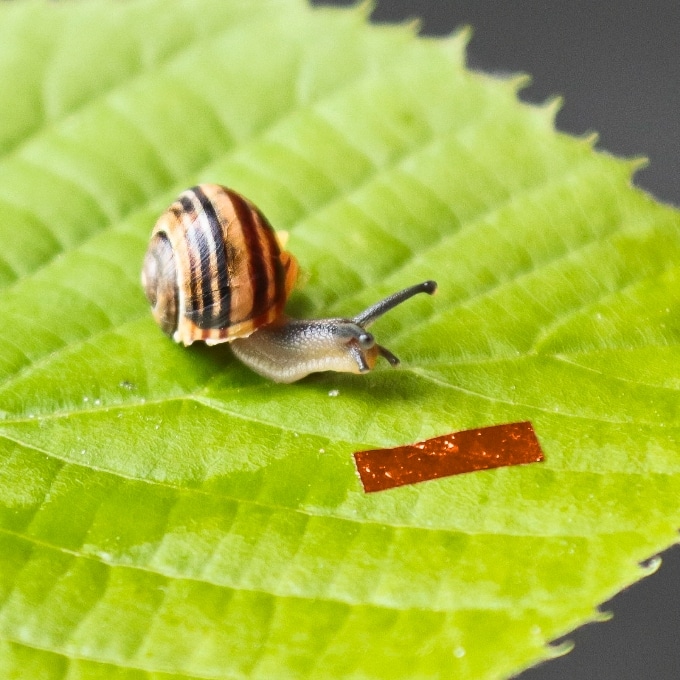Aug 1 2019
Liquid crystal elastomer technology was used by researchers at the Faculty of Physics at the University of Warsaw, Poland to show the capability of a bio-inspired microrobot to imitate the adhesive locomotion of snails and slugs in natural scale. The soft, 10-mm long robot harvests energy from a laser beam to climb an upside-down glass ceiling and vertical walls, and crawl on horizontal surfaces.
 Photo of the snail robot next to a garden banded snail (Cepaea hortensis). (Image credit: UW Physics)
Photo of the snail robot next to a garden banded snail (Cepaea hortensis). (Image credit: UW Physics)
The concept of a soft body to crawl by traveling deformation is a common mode of locomotion found in microscopic nematodes, gastropods, and also in earthworms. Animals across scales make use of this mode of locomotion to move around environments that are both challenging and different.
Snails specifically use a slippery, aqueous secretion called mucus to govern the interaction between their ventral foot and the surface. This adhesive locomotion has its own unique properties—it is capable of being employed on a variety of surfaces, including glass, sand, metal, wood or Teflon (PTFE) in different configurations such as crawling upside-down.
As far as robotics is concerned, low complexity of a single continuous foot could possibly offer resistance to unpleasant external conditions and wear and tear, whereas the persistent contact with the ground could provide high margins of failure resistance. So far, adhesive locomotion in robots has been restricted to externally powered, centimeter-scale demonstrators accompanied with electro-mechanical drives.
Liquid Crystalline Elastomers (LCEs) are considered to be smart materials capable of displaying macroscopic, flexible, fast, reversible change in shape under varied stimuli, such as illumination with visible light. LCEs can be fabricated in different forms in the micro- and millimeter scales. The molecular orientation engineering further allows them to perform difficult modes of actuation.
A natural-scale soft snail robot has been recently developed by researchers from the University of Warsaw with colleagues from the Department of Mathematical Sciences at Xi’an Jiaotong-Liverpool University in Suzhou, China. This was achieved based on the opto-mechanical response of a liquid crystalline elastomer continuous actuator.
The robot propulsion is activated by the soft body’s light-induced traveling deformations and their communication with the artificial mucus layer (glycerin). This robot is capable of crawling at the speed of a few millimeters per minute, almost 50 times slower when compared to snails of comparable size. It can also crawl across obstacles, on a glass ceiling, and up a vertical wall.
Despite the slow speed, need of constant lubrication and low energy efficiency, our elastomer soft robot offers unique insights into micromechanics with smart materials and may also provide a convenient platform for studying adhesive locomotion.
Piotr Wasylczyk, Study Lead and Head of Photonic Nanostructure Facility, Faculty of Physics, University of Warsaw
Researchers, who earlier illustrated a natural-scale light-power caterpillar robot, are certain that new generation of smart materials along with unique fabrication techniques will soon be able to discover additional areas of small-scale soft robotics and micro-mechanics.
The National Science Center (Poland) funds the research on soft micro-robots and polymer actuators within the project “Micro-scale actuators based on photo-responsive polymers.” Funding is also provided by the Polish Ministry of Science and Higher Education with "Diamentowy Grant" awarded to M. Rogóż.